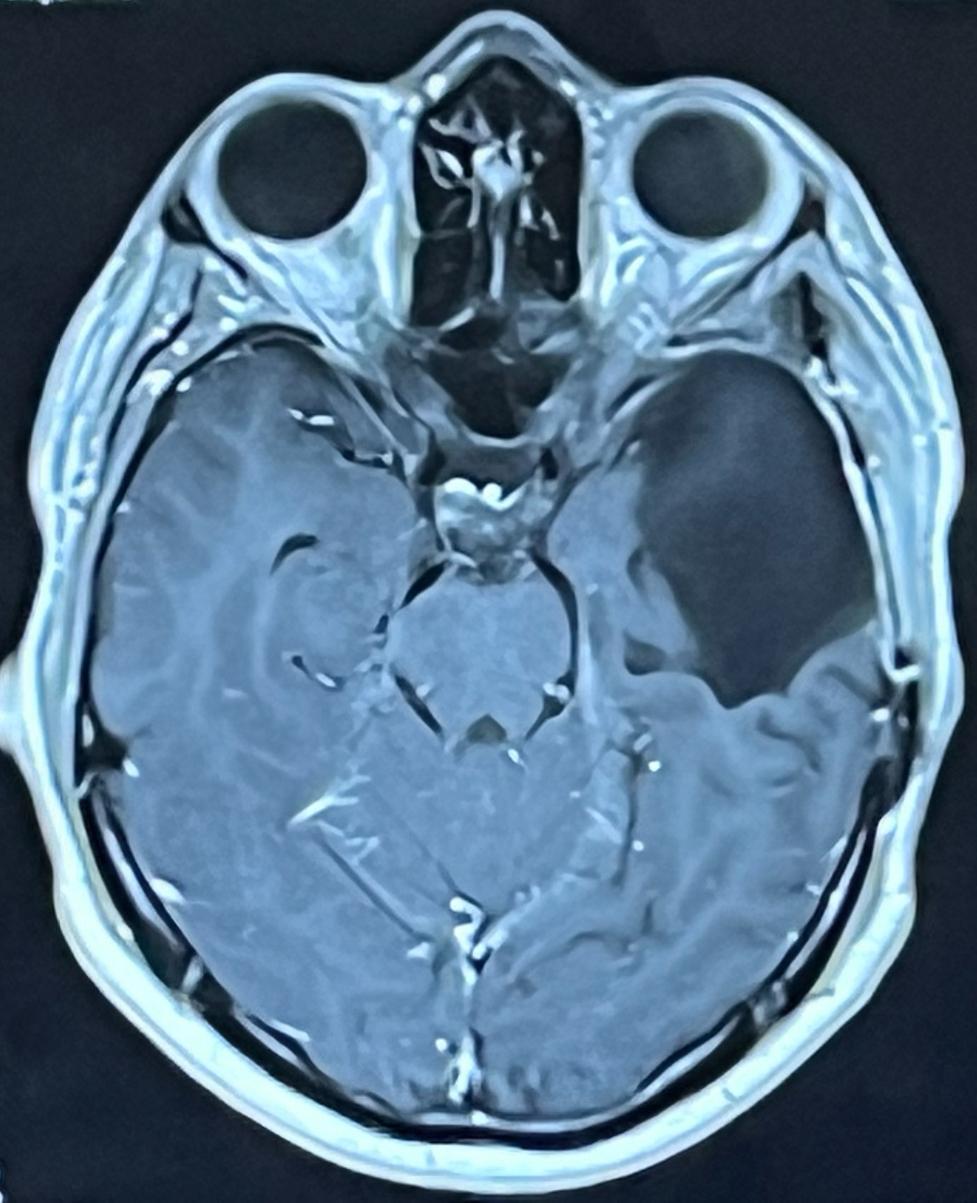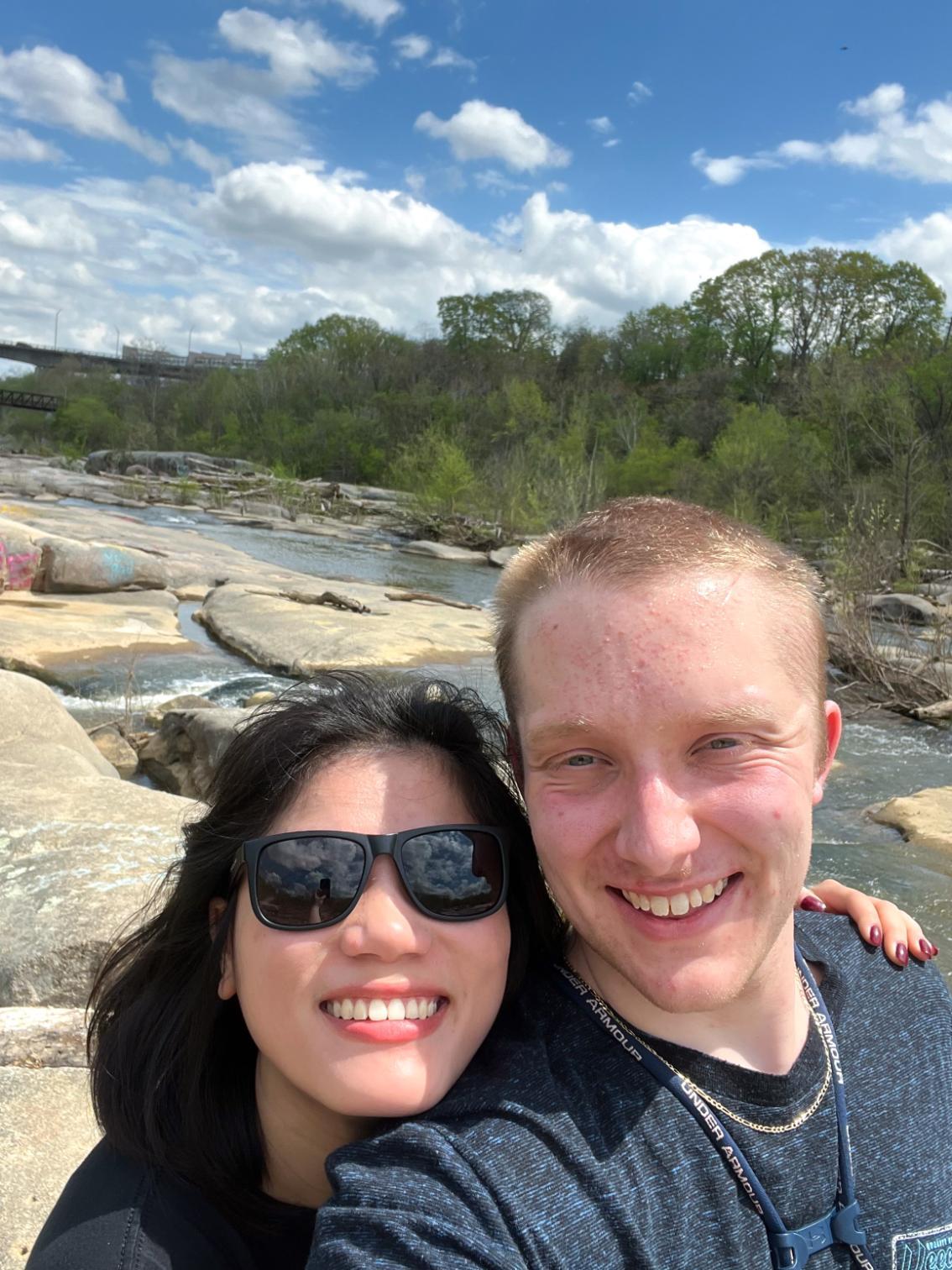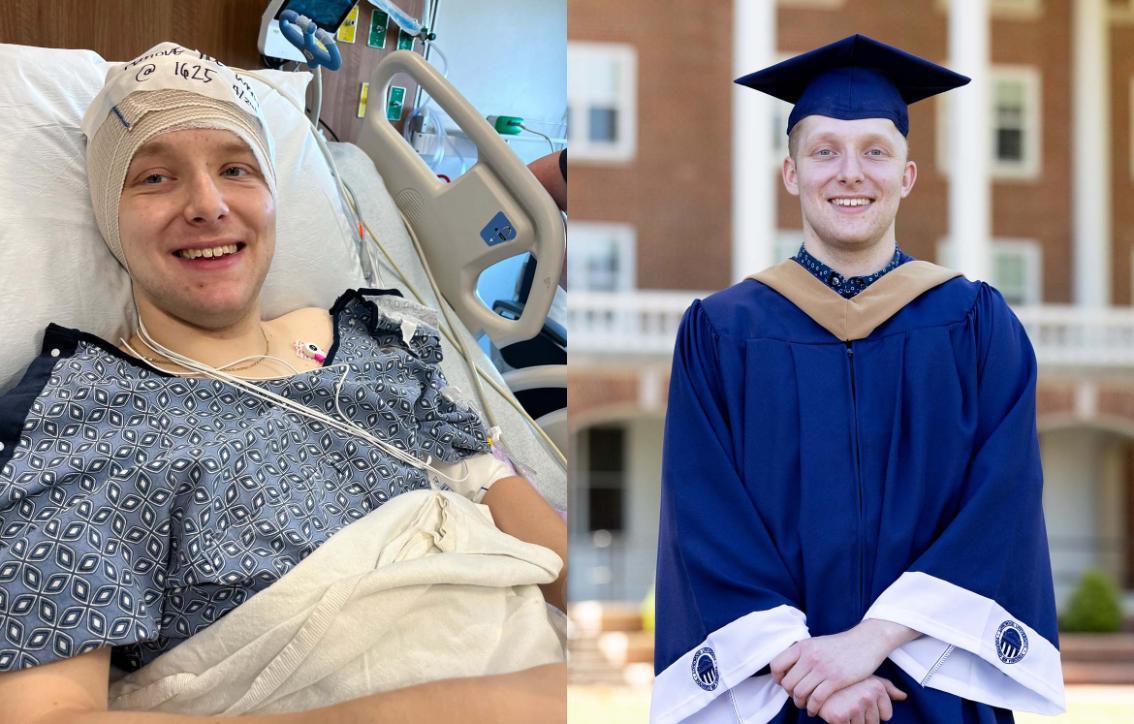Hunter Manning ’25 says he’s always been lucky.
That’s not necessarily something you’d expect to hear from a young man who discovered he had a malignant brain tumor during his senior year of college; who had to deal with the increased difficulties of reading and speaking that resulted from brain surgery last spring; who developed depression from one of his anti-seizure medications.
And yet, when you hear his story, you can see why Manning feels lucky.
I was told I might have only a short time to live, and now I’m about to graduate.
Hunter Manning ’25 Tweet This
“I was told I might have only a short time to live, and now I’m about to graduate,” he said.
Manning made the dean’s list in fall 2024, and he’s taking a full load of classes this semester. He’s on track to receive his degree in business administration/management this May. All of that is due to hard work—plus the support of his family, friends and Longwood faculty and staff—not luck, but there are some undeniably lucky aspects of the challenges Manning has faced over the last year.
For example, just before he had the seizure in February 2024 that would lead to his diagnosis, something told him to get up and unlock his bedroom door in the campus apartment he shared with his roommates.
“I had a migraine, and I had been taking a nap. I got up and unlocked that door. I don’t remember anything else,” Manning said. “My roommates said I was just seizing on the floor.”
Because the door was unlocked, his roommates were able to check on him. They called an ambulance, and Manning got to the hospital quickly.

Scans showed a tumor in the speech center of his brain, and a biopsy revealed it was malignant.
But luck was on Manning’s side again when the time came to remove the tumor.
The surgeon who was originally scheduled to perform the surgery estimated he would be able to remove only 80 percent of the tumor—but on the day before that operation, Manning got a call from Dr. Allan Friedman at Duke. A neurosurgeon and brain cancer specialist, Friedman was confident he could remove the whole tumor. Manning cancelled his existing appointment and headed to Duke.
“I was lucky,” he said. “They removed 100 percent of the noticeable tumor. It took me more than a week to even realize how much of a victory that was.”
That was an important hurdle, but there were many more to cross before he could return to his studies at Longwood.

“For several weeks after that surgery, my brain was not itself. I had trouble reading, and I basically couldn’t remember a lot of words. Plus I was overly sad all the time until my girlfriend pointed out my anti-seizure medication was messing with my mood,” said Manning, who is from South Hill, Virginia. “I had six weeks of radiation and chemotherapy. We drove down to Duke and back every morning. Every day after we got back, I would go the gym and work out. Then, on nights when I didn’t have radiation the next day, I would go to work at 313 [Franklin Cocktails & Kitchen in South Hill]. I also helped out moving furniture for my dad’s antiques business.”
Then starting in summer 2024 came the next round of treatment: 12 months of a different course of chemotherapy. “This time it was overwhelming. It hit hard,” Manning said.
Nevertheless, he was back at Longwood by fall semester 2024, and the side effects of the chemo eventually lessened. He buckled down to his studies, determined to do well despite the impact of the surgery on his reading and speaking abilities. He earned all A’s that semester, and he’s working hard again this semester, keeping his eye on the prize: completing his degree, which includes not only his major but also minors in supply chain management and computer science.
That’s something that’s great about Longwood. If you reach out to any of your professors, they always get back to you and try to help you.
Hunter Manning ’25 Tweet This
He says he couldn’t have done it without the support of his professors and staff at Longwood.
“I didn’t tell any other students, but I told my professors. They were really supportive, which they always are,” Manning said. “That’s something that’s great about Longwood. If you reach out to any of your professors, they always get back to you and try to help you.”
One of those professors is Patti Carey, who teaches in the College of Business and Economics. She has had Manning in her classes both before and after his surgery and cancer treatment. Currently he’s in her Human Resources Management class.
As a person, he’s always positive and upbeat. He brings a smile and a can-do attitude to everything he does. His positive and grateful attitude seems to be at his core, and that’s what I continue to see in him.
Hunter Manning ’25 Tweet This
“He sits right in front of me,” said Carey, who sent Manning an encouraging letter when she found out about his diagnosis. “Hunter is a dedicated student. He completes assignments on time, adds value to class discussions and is conscientious. As a person, he’s always positive and upbeat. He brings a smile and a can-do attitude to everything he does. His positive and grateful attitude seems to be at his core, and that’s what I continue to see in him.”
That grateful attitude shows in Manning’s feelings about the help he has received from so many. “I would like to take care of those around me as much as I was taken care of when I needed it most,” he said.
And he has learned some important lessons. “Little things no longer stress me as much. I used to get worried about what everybody thought about me. Now I think about that much less.”
Another change he’s noticed is that he’s putting more effort into his life in general and taking things more seriously, including his academic work.
Before, when I would get an extra assignment or just something else to do, my attitude would be, ‘I’ve got to do this.’ Now I think, ‘I get to do this. I am still in college.
Hunter Manning ’25 Tweet This
“Everything has taken on more importance because I thought at some point I might not be able to experience those things. Appreciation is big, too. Before, when I would get an extra assignment or just something else to do, my attitude would be, ‘I’ve got to do this.’ Now I think, ‘I get to do this. I am still in college.’”
One of the things he’s looking forward to doing soon is embarking on a career. He hasn’t made any firm commitments yet, but he’s thinking about going into real estate or building on his restaurant experience with the goal of becoming a manager.
And with his chemotherapy wrapping up soon and no sign of the tumor coming back, he’s looking even further down the road: “Long, long term I’d like to get married, follow the great example my parents set in raising a family, and own my own successful restaurant.”



Leave a Comment